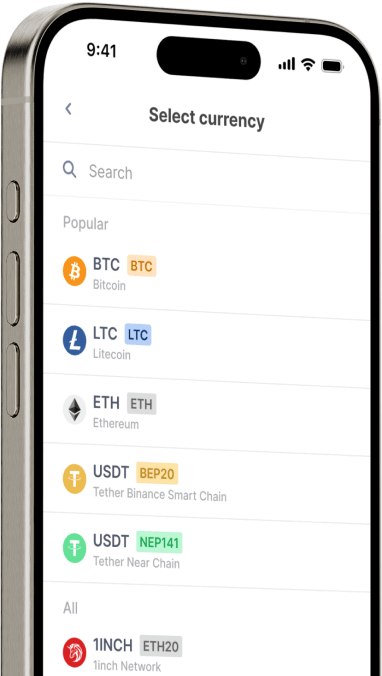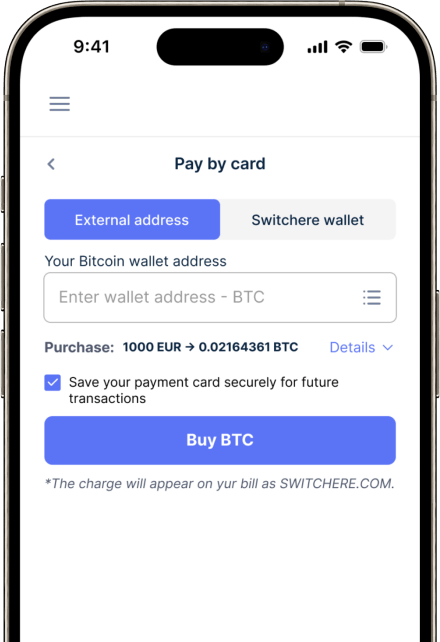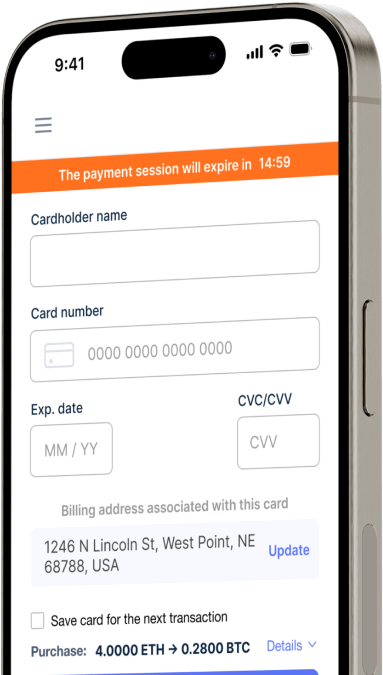Dönüştürmek
United Arab Emirates dirham (AED)'dan Binance USD (BUSD)'ye aniden
Switchere'de Binance USD (BUSD) ile kolayca United Arab Emirates dirham (AED) satın alın ve hızlı, güvenli işlemlerden yararlanın.
Hakkında
Binance USD (BUSD)
BUSD (BUSDBSC), değişken dijital varlık ortamında fiyat istikrarı sağlamak için tasarlanmış, ABD dolarına 1:1 oranında sabitlenmiş, düzenlenmiş, fiat destekli bir sabit coindir. Paxos Trust Company tarafından Binance ile ortaklaşa çıkarılan BUSD, güvenilir bir değişim aracı ve değer deposu sunmayı amaçlamaktadır. "BUSDBSC" kısaltması, kapsamlı DeFi uygulamalarını kolaylaştıran yüksek performanslı, merkezi olmayan bir ağ olan BNB Smart Chain üzerinde bir BEP-20 token olarak varlığını özellikle belirtir. BUSD'nin arkasındaki temel teknoloji, özel hesaplarda tutulan şeffaf, denetlenmiş ABD doları rezervlerine dayanır ve her bir tokenin eşdeğer miktarda fiat para birimi ile desteklenmesini sağlar. Bu, algoritmik sabit coinlerle tezat oluşturarak, sabitini ve kriptografik güvenliğini korumak için farklı bir yaklaşım sunar.
BUSD'nin, özellikle de BUSDBSC varyantının birincil faydası, BNB Chain'in ekosistemine minimum fiyat riski ile sorunsuz işlem ve katılım sağlamaktır. Tokenomiği basittir: Paxos'a dolar yatırıldığında yeni BUSD basılır ve itfa edildiğinde yakılarak 1:1 destek sağlanır. Öne çıkan kullanım alanları arasında PancakeSwap gibi borsalarda diğer kripto paralara karşı alım satım yapmak, borç verme ve borç alma protokollerinde teminat olarak hizmet etmek, çeşitli DeFi uygulamalarında yield farming yapmak ve eşler arası ödemeleri kolaylaştırmak yer alıyor. NYDFS onaylı (Paxos tarafından çıkarılan Ethereum versiyonu için) ve yaygın olarak benimsenen bir stablecoin olarak BUSD, çeşitli blok zinciri teknolojisi platformlarında likidite ve güvenilir, uyumlu bir dijital dolar temsili sağlamada önemli bir rol oynamakta ve birçok Web3 altyapısı ve zincir içi finansal faaliyet için temel bir unsur olarak hareket etmektedir.
Diğer 150+ Kripto Para Birimlerini United Arab Emirates dirham (AED) karşılığında satın alın
United Arab Emirates dirham (AED) için Diğer Madeni Paralar
-
AED için ZRX
-
AED için 1INCH
-
AED için AAVE
-
AED için ACH
-
AED için ALGO
-
AED için TLM
-
AED için ANKR
-
AED için APE
-
AED için NFT
-
AED için API3
-
AED için APT
-
AED için ARPA
-
AED için AUDIO
-
AED için AVAX
-
AED için AVAX
-
AED için AXS
-
AED için BADGER
-
AED için BAL
-
AED için BNT
-
AED için BAT
-
AED için BNB
-
AED için BUSD
-
AED için BSW
-
AED için BSV
-
AED için BLUR
-
AED için BONE
-
AED için CTSI
-
AED için CELR
-
AED için CELO
-
AED için CEL
-
AED için LINK
-
AED için CHZ
-
AED için CHR
-
AED için C98
-
AED için COMP
-
AED için CFX
-
AED için PEOPLE
-
AED için CVX
-
AED için ATOM
-
AED için CTC
-
AED için CRV
-
AED için DAI
-
AED için DASH
-
AED için MANA
-
AED için DENT
-
AED için DGB
-
AED için LEASH
-
AED için DYDX
-
AED için XEC
-
AED için EOS
-
AED için ETC
-
AED için ENS
-
AED için ETHW
-
AED için FET
-
AED için FIL
-
AED için FLOKI
-
AED için GALA
-
AED için GNO
-
AED için ONE
-
AED için HBAR
-
AED için HOT
-
AED için HOOK
-
AED için ICX
-
AED için ILV
-
AED için IMX
-
AED için INJ
-
AED için ICP
-
AED için IOST
-
AED için IOTX
-
AED için JASMY
-
AED için JST
-
AED için KAVA
-
AED için KCS
-
AED için KSM
-
AED için KNC
-
AED için LDO
-
AED için LQTY
-
AED için LPT
-
AED için LOOKS
-
AED için LRC
-
AED için LUNA
-
AED için MKR
-
AED için MASK
-
AED için EGLD
-
AED için ALICE
-
AED için NEAR
-
AED için XEM
-
AED için NEXO
-
AED için NOT
-
AED için NMR
-
AED için OKB
-
AED için OMG
-
AED için ONT
-
AED için EDU
-
AED için OP
-
AED için OGN
-
AED için CAKE
-
AED için PAXG
-
AED için PENDLE
-
AED için DOT
-
AED için POL
-
AED için QTUM
-
AED için QNT
-
AED için RDNT
-
AED için XRD
-
AED için RVN
-
AED için REN
-
AED için RSR
-
AED için RLC
-
AED için RPL
-
AED için SFP
-
AED için SHIB
-
AED için SKL
-
AED için SXP
-
AED için STND
-
AED için STG
-
AED için XLM
-
AED için GMT
-
AED için STORJ
-
AED için STMX
-
AED için SUSHI
-
AED için SNX
-
AED için USDT (NEP141)
-
AED için USDT (FA2)
-
AED için USDT (TRC20)
-
AED için USDT (JETTON)
-
AED için USDT (SPL)
-
AED için USDT (ERC20)
-
AED için USDT (AVAC)
-
AED için USDT (BEP20)
-
AED için USDT (Polygon)
-
AED için XTZ
-
AED için GRT
-
AED için SAND
-
AED için TFUEL
-
AED için THETA
-
AED için RUNE
-
AED için TON
-
AED için TUSD (BEP20)
-
AED için TUSD (TRC20)
-
AED için TWT
-
AED için UOS
-
AED için UMA
-
AED için UNI
-
AED için USDC (SPL)
-
AED için USDC (Polygon)
-
AED için USDC (OP)
-
AED için USDC (TRC20)
-
AED için USDC (BEP20)
-
AED için USDC (BEP20)
-
AED için USDC (AVAC)
-
AED için USDC (ARB)
-
AED için USDC (ERC20)
-
AED için VET
-
AED için VRA
-
AED için WAXP
-
AED için WOO
-
AED için WLD
-
AED için WBTC
-
AED için WMINIMA
-
AED için XDC
-
AED için YFI
-
AED için YGG
-
AED için ZIL
Binance USD (BUSD) Nasıl Satın Alınır
Sıkça Sorulan Sorular
-
AED/BUSD işlem çifti tam olarak nedir?
AED/BUSD çifti, Birleşik Arap Emirlikleri Dirhemi (AED) kullanarak ABD Doları'na 1:1 oranında sabitlenmiş bir stabilcoin olan Binance USD'yi (BUSD) satın almanıza olanak tanıyan doğrudan bir fiat on-ramp'i temsil eder. BUSD, Paxos tarafından ihraç edilen ve NYDFS tarafından onaylanan, hem BNB Smart Chain'de bir BEP-20 tokeni hem de Ethereum'da bir ERC-20 tokeni olarak var olan, düzenlenmiş, fiat teminatlı bir stabilcoindir ve Orta Doğu'nun önemli bir para biriminden istikrarlı bir dijital varlık giriş noktası sağlar.
-
AED işlemleri için BUSD stabilcoin kullanmanın faydaları nelerdir?
BUSD kullanmak, USD'ye 1:1 sabitlendiği için istikrar sağlar ve diğer dijital varlıklarda yaygın olan oynaklığı azaltır. Paxos tarafından NYDFS düzenlemesi altında ihraç edilmesi, aylık rezerv kanıtı denetimleriyle desteklenen yüksek derecede güven ve şeffaflık sunar. Ayrıca, BNB Smart Chain'de bir BEP-20 tokeni olarak mevcut olması, geniş DeFi ekosistemiyle etkileşimde bulunurken hızlı ve düşük maliyetli işlemlere olanak tanır.
-
AED ile satın aldıktan sonra BUSD'yi nasıl güvenli bir şekilde saklayabilirim?
Maksimum güvenlik için, BUSD'nizi borsadan özel anahtarları kontrol ettiğiniz gözetimsiz bir dijital cüzdana aktarmak en iyi uygulamadır. BUSD'nizin hangi blok zincirinde bulunduğuna (BEP-20 veya ERC-20) bağlı olarak, Trust Wallet, MetaMask gibi uyumlu cüzdanları veya soğuk depolama için bir donanım cüzdanı (Ledger veya Trezor gibi) kullanabilirsiniz. Temel bir güvenlik katmanı olarak borsa hesabınızda her zaman iki faktörlü kimlik doğrulamayı (2FA) etkinleştirin.
-
BAE Dirhemi ile BUSD satın almanın yaygın yöntemleri nelerdir?
AED kullanarak BUSD satın almak için yatırımcılar genellikle BAE'de faaliyet gösteren düzenlenmiş kripto para borsalarını kullanır. Başlıca ödeme yöntemleri arasında yerel BAE banka havaleleri, banka/kredi kartı alımları ve eşler arası (P2P) platformlar bulunur. Tüm bu yollar, kimliğinizi doğrulamanız gereken KYC/AML uyumluluğunu gerektirir. Satın alma işleminden sonra BUSD, borsadaki dijital cüzdanınıza yatırılır.
-
AED'yi BUSD'ye dönüştürmeyle ilgili ücretler nelerdir?
Ücretler platforma ve ödeme yöntemine bağlı olarak değişebilir. Genellikle, banka veya kart yoluyla AED transferleri için para yatırma ücretleri, işlemi gerçekleştirdiğinizde borsanın emir defterindeki işlem ücretleri (yapıcı/alıcı ücretleri) ve BUSD'nizi harici bir dijital cüzdana taşırsanız potansiyel para çekme ücretleri bekleyebilirsiniz. Kartlı ödemeler genellikle yerel banka havalelerinden daha yüksek işlem ücretlerine sahiptir ancak anında ödeme imkanı sunar.
-
AED'den dönüştürüldükten sonra BUSD'nin birincil kullanım alanları nelerdir?
BUSD'ye sahip olduğunuzda, daha geniş kripto piyasasına bir geçiş kapısı görevi görür. Başlıca kullanım alanları şunlardır: 1) Merkezi ve merkezi olmayan borsalarda diğer dijital varlıklara karşı işlem yapmak. 2) Fiat'a çıkmadan piyasa oynaklığına karşı korunmak için istikrarlı bir değer saklama aracı olarak hareket etmek. 3) Özellikle BNB Smart Chain ekosisteminin düşük ücretli ortamında borç verme, borç alma ve getiri çiftçiliği için merkezi olmayan finans (DeFi) protokollerine katılmak.




